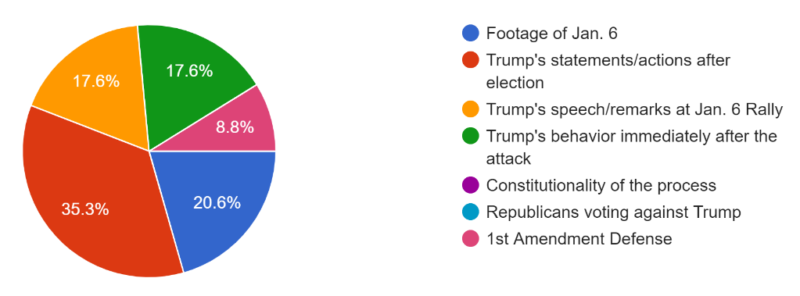
Post-Impeachment Survey Results
What did Government teachers think about the recent impeachment of Donald Trump? And what kind of teaching experience did they have with impeachment and the subsequent trial in the Senate? I offered a survey to Government teachers. Hopefully, this summary and analysis allow for some insight into those questions.
Keep in mind, this was by no means a scientific poll. The questions were conceived and refined over early morning coffee. The sample wasn’t huge. A few dozen teachers participated. They do, however, come from a variety of schools and locations.
—Michael Cardoza, Cornerstone Collegiate Academy, Seoul, South Korea
Overwhelmingly, these high school government teachers agreed the U.S. House should have voted to impeach Trump (88%), that, if they were a sitting senator, they would have voted to convict (87.9%), and that, now that it’s over, the endeavor was worth the effort (76.5%). I would assume some liberal-educator bias must factor in here, as well as those willing to talk about it versus those not and how that shapes the sample.
Regarding the most relevant evidence or argument in the trial, Trump’s “statements/actions after the election” ranked first at 36%. At second, a little over 20% said the footage of the insurrectionists breaking into the Capitol. The president’s statements at his January 6 rally tied for third with his “action/inaction” after the riots began. 
Government teachers expressed a clear opinion on the institutions involved. Nearly 58% said the media coverage of the impeachment and trial was generally fair and objective, while over one-third, or 36%, said the media was biased “toward convicting Trump.” A little over 77% felt the Senate should have voted to hear witnesses.
Once the Senate acquitted Trump by a vote of 57 to 43, political pundits asked, what influence will he have in Republican politics in the near and distant future? Over 31% of government teachers surveyed here said that Trump is the current frontrunner for the GOP nomination in 2024. Others were skeptical but did not rule this out. “I think it depends on whether or not the Republican party can find another Republican to rally behind and how much of the ‘America First’ rhetoric truly resonates with mainstream Republicans,” said one respondent. Another acknowledged, “Trump will be a major influence on the 2022 mid-terms,” but doubted a frontrunner status for the GOP primaries nor a contender for the 2024 general election.
—Skyler Wiens, Bentonville West High School, Arkansas
Teachers agree teaching the impeachment has been a challenge. Surely after the House voted and as the trial approached, many of us wondered anxiously about what impact this might have on our classes. “I’ve been exhausted the last five years in my role as government teacher,” said one tired educator. “It’s been difficult, draining, and tiresome.”
In how teachers “found the impeachment,” 40% said they found it “interesting.” Nearly a third, 31%, found it “difficult.”
Refreshing was how teachers reported their students’ reaction or demeanor in class. Most students were civil and tame. Nearly 29% of teachers said their students were “respectful.” An additional 14% categorized theirs as “vocal and opinionated, yet sophisticated.” Seventeen percent labelled students “uninterested,” and 23% called theirs “quiet, less willing to discuss.” It sounds like when impeachment surfaced in classrooms, roughly 43% of teachers gave their students satisfactory to high marks on civil discourse. Surely some of the unwilling-to-discuss factor results from student respect to avoid conflict. Teachers expressed concern before the gig was over, understandably. In some classrooms, the subject was avoided or only scratched out of concern for classroom chaos.
Teachers used a variety of lessons, activities, or strategies to teach the impeachment, and many used multiple methods. Most, 42%, ranked class discussion/Q&A as their main way. Video clips (27%) and presentations (12%) followed.
The most common question or issue that came up, at 29%, was the practicality of the endeavor. This makes sense, as the Republican argument against holding the trial and the Senate vote before the trial forecast the final vote. Why hold it?
As far as political predictions, if this report were presented as a word cloud, “primaried” would stand out. Many predict that most of the ten House members who accused Trump and some of the seven senators who betrayed him with a conviction vote will face primary challenges and other political repercussions. “Because of the insanity of the Republican base,” one submitted, “they are toast in the short run.”
To keep the conversation going, several teachers wondered about the political realities to come.
—Stephanie Roybal, Justin-Sienna High, Napa, CA
Constitutionally, one respondent asked, “Since the constitutionality of the process was in question altogether, does this mean that Congress will try to better define the impeachment process in the future?” This to try and answer those pesky questions like, can Congress impeach and remove someone who has already left office? Based on the legal debate we heard, we may see a movement for a constitutional amendment to clear that up.
Teachers posed an array of questions to consider or watch out for. Whether or not potential state and federal charges against Trump for violations before and after January 6 will alter things. The New York DA now has access to his tax records and there’s a new chain of command in the realm of federal law enforcement. How will those allegations, whether adjudicated or not, impact his political power and chances at future election?
“Will the Republican Party split?” Will it “splinter,” operating with solid opposing factions. Will the Republican Party gain seats in Congress after the 2022 midterm elections, as the party out of the White House usually does? This week’s GOP in-fighting and splintering, you would think, would only assist Democrats in the general elections. We’ll see.
David Wolfford is author of the AMSCO’s AP U.S. Government and Politics, teaches at Mariemont High in Cincinnati, and edits the Ohio Social Studies Review.